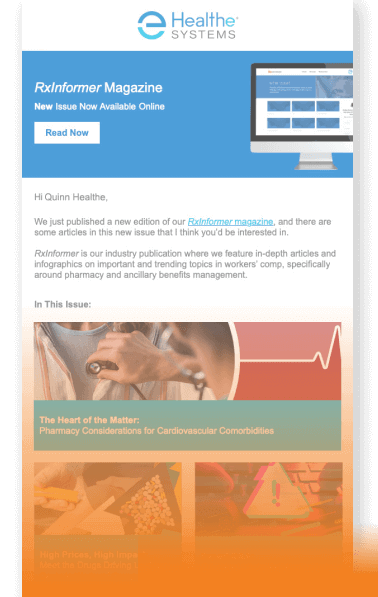Hyaluronic acid injectable products such as Synvisc® and Orthovisc® are specialty medications for arthritis-related pain. Many claims professionals have asked: Why am I seeing more of these products prescribed to my work comp claimants?
Hyaluronic acid (HA) products such as Synvisc® and Orthovisc® are used to treat pain resulting from osteoarthritis of the knee. This is done through a procedure called viscosupplementation, in which a doctor injects lubricating fluid into a joint. In this case, the HA acts as a cushion in the knee joint.
Due to the high cost associated with HA injectables and the necessity for administration by a doctor, they are considered a specialty medication.
More and more HA injectables have become available on the market in the last few years. They are also being prescribed more frequently in workers’ comp. However, there are some concerns and considerations around the clinical appropriateness and cost of these products that claims professionals should be aware of when making an authorization decision for a claim.

Osteoarthritis is a common form of arthritis that can be caused or worsened by multiple factors. This may include occupations with a higher level of physical demands that can wear on skeletal joints, such as mining, construction, agriculture, and certain areas of the service industry. In other cases, arthritis may not be the primary workplace-related injury. Rather, joints weakened by underlying arthritis may make a worker more susceptible to acute injury.
In either case, treatment of arthritis is important to help:
However, it is important to understand that HA therapies may be prescribed off-label in workers’ compensation, and not necessarily for osteoarthritis of the knee, as they are intended. This may be extremely difficult for the claims professional to determine if the diagnosis is unclear or they do not have access to the diagnosis.

Even if osteoarthritis is a part of the work comp claim, it is important to understand that HA injectables are not a first-line therapy. These products are not as clinically appropriate or cost-effective as other first line therapies. There are more clinically effective and less costly treatments for osteoarthritis that should be tried first. These can include:

If a HA product is prescribed to an injured worker claimant, here are some important questions to ask when making the authorization decision:
In the event assistance is required analyzing a patient’s drug regimen, Healthesystems’ clinical pharmacists are available to answer questions for our customers and pharmacists within our network. Please contact our Ask a Pharmacist Drug Line at 866.646.2838. Questions can also be submitted online at www.healthesystems.com.
